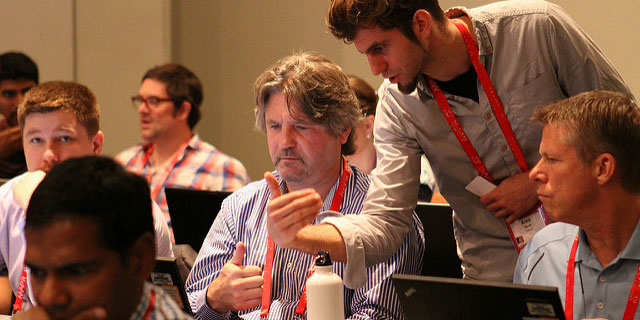In-Person Training
Moving to microservices and beyond

What you'll learn, and how you can apply it
By the end of this two-day training course, you'll understand:
- What makes a good microservice
- How to plan and manage a migration from a monolith to a microservice architecture
- How technical choices can impact the architecture itself
And you'll be able to:
- Use concepts from domain-driven design to define service boundaries
- Manage change and governance in a microservice environment
Prerequisites:
- A basic understanding of service-oriented architectures generally or microservices specifically (useful but not required)
There is lots of theory out there about microservice architecture, but how often do you get to put that knowledge into practice? In the real world, it’s not feasible to rearchitect your system often, and certainly not in a single day. . .or is it?
Sam Newman leads a workshop that gives you a safe space to explore ideas behind microservice architectures with peers from other organizations. Sam shares some framing for microservice architectures that explores the various forces that can drive the design and evolution of microservices before leading you through a series of interactive architectural kata exercises to put your newfound knowledge to the test. You’ll gain valuable experience with a series of tools you can immediately put into practice in your own projects.
About your instructor

Sam Newman is an independent consultant specializing in helping people ship software fast. Sam has worked extensively with the cloud, continuous delivery, and microservices and is especially preoccupied with understanding how to more easily deploy working software into production. For the last few years, he’s been exploring the capabilities of microservice architectures, and he’s worked with a variety of companies in multiple domains around the world, often with one foot in the developer world and another in the IT operations space. Previously, he spent over a decade at ThoughtWorks and then another year with a startup. Sam speaks frequently at conferences. He’s the author of Building Microservices (O’Reilly). If you’d like to get in touch, please email him.
Conference registration
Get the Platinum pass or the Training pass to add this course to your package.
Comments on this page are now closed.
Sponsorship Opportunities
For exhibition and sponsorship opportunities, email SAconf@oreilly.com
Partner Opportunities
For information on trade opportunities with O'Reilly conferences, email partners@oreilly.com
Contact Us
View a complete list of O'Reilly Software Architecture contacts
©2018, O'Reilly Media, Inc. • (800) 889-8969 or (707) 827-7019 • Monday-Friday 7:30am-5pm PT • All trademarks and registered trademarks appearing on oreilly.com are the property of their respective owners. • confreg@oreilly.com







Comments
Hi Anar,
The course outline varies from class to class, based on the attendees – they help pick what modules/topics we cover. This is an indicative outline, but note we are unlikely to cover exactly what is detailed below as every class is a bit different:
Introducing Microservices
Service Modelling
Splitting Out Services
Service Collaboration
Testing
Build & Deployment
Observability
Resiliency & Scaling
User Interfaces / Mobile
Hi Orlon,
No specific prep work is needed – an understanding of microservices may help, but isn’t required. You also don’t need any software – this isn’t a hands-on coding course, but feel free to bring your laptop to take notes or look up references.
Anything we need to set up before we get there? The email mentioned there may be “homework.” What materials or software is needed to be prepared if any?
Hello,
plz could you share the training outline?
Hello,
plz could you share the training outline?